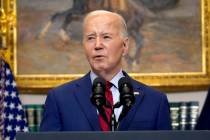Maine judge orders temporary restrictions for nurse
FORT KENT, Maine — The American nurse who had defied the state of Maine’s quarantine order after her return from Sierra Leone treating Ebola patients said a judge’s rejection of the order on Friday was a good compromise.
Maine Governor Paul LePage wanted the nurse, Kaci Hickox, to be quarantined in her house until the middle of next month even though she has tested negative for the virus and says she is healthy.
This is a developing story. The previous story is below.
A judge on Friday ordered an American nurse who treated Ebola patients in Sierra Leone for the disease to obey a state-imposed quarantine after she defied Maine officials and went for a bike ride.
The temporary order from Charles LaVerdiere, chief judge of the Maine District Court, turned up the heat in the confrontation over the quarantine between the New England state’s officials and nurse Kaci Hickox.
LaVerdiere instructed Hickox to submit to “direct active monitoring” and “not to be present in public places” like shopping centers, movie theaters or workplaces, except to receive necessary healthcare.
Maine Gov. Paul LePage said on Friday it was unfortunate that a judge rejected the state’s attempts to impose a strict quarantine on an American nurse who treated Ebola patients in West Africa, but said he will abide by the ruling.
The ruling appeared to end a stand-off between the state and Hickox.
“The judge has eased restrictions with this ruling. and I believe it is unfortunate,” LePage said in a statement. “However, the state will abide by law.”
Hickox, 33, has tested negative for Ebola after returning from working for Doctors Without Borders in Sierra Leone, one of the three impoverished West African countries at the heart of the outbreak that has killed about 5,000 people there. Saying she is completely healthy, she has challenged quarantines imposed on her in both New Jersey, where she arrived, and her home state of Maine.
The confrontation between Hickox and Maine has become the focal point of a dispute pitting several U.S. states opting for stringent measures to guard against Ebola against the federal government, which has expressed concern that such measures could discourage potential medical volunteers from fighting the outbreak in West Africa.
Medical professionals say Ebola is difficult to catch and is spread through direct contact with bodily fluids from an infected person and is not transmitted by asymptomatic people. Ebola is not airborne.
The Maine order permits Hickox to engage in what the judge called “non-congregate public activities” like walking or jogging in a park, but instructs her to maintain a three-foot distance from other people.
Outside her two-story home on Friday, there were numerous journalists and television news trucks, as well as a state trooper parked across the street to keep an eye on the house. The local police chief entered the home but afterward declined to tell reporters what was discussed, saying it was a “good morning conversation.” Hickox did not appear in public.
LaVerdiere wrote that his order came in response to the state’s request “regarding the public health threat allegedly posed” by the nurse.
The order, dated on Thursday but made public on Friday, said Hickox’s attorney agreed that the nurse would not leave her home for the time being. LaVerdiere wrote that a full hearing on the matter must be held not less than three days and not more than 10 days from when the state sought to enforce its quarantine.
On Thursday, Hickox defied Maine officials and left her home in the small town of Fort Kent, along the Canadian border, taking a bicycle ride with her boyfriend. Hickox had given Maine a deadline of Thursday to lift an order that she remain at home until Nov. 10. The state did not lift the quarantine.
The nurse previously blasted New Jersey Governor Chris Christie after she was taken from Newark’s airport and put in isolation in an unheated tent before being taken to Maine to spend the rest of her 21-day quarantine at home. Twenty-one days is the maximum incubation period for Ebola.
U.S. public concern about the virus is high even though only one person in the country is currently being treated for it, a New York doctor, Craig Spencer, who cared for patients in West Africa. Spencer, 33, was in serious but stable condition, New York’s Bellevue Hospital said on Thursday.
In New York on Friday, U.S. Ambassador to the United Nations Samantha Power defended federal guidelines for monitoring healthcare workers returning from the three Ebola-stricken countries. Power spoke at a Reuters Newsmaker event hours after returning from a four-day trip to Liberia, Guinea and Sierra Leone.
She said she believed current federal guidelines for returning healthcare workers balanced “the need to respond to the fears that this has generated” in the United States with the known science on the disease.
Additional reporting by Brendan O’Brien, Jonathan Allen and Will Dunham.





























